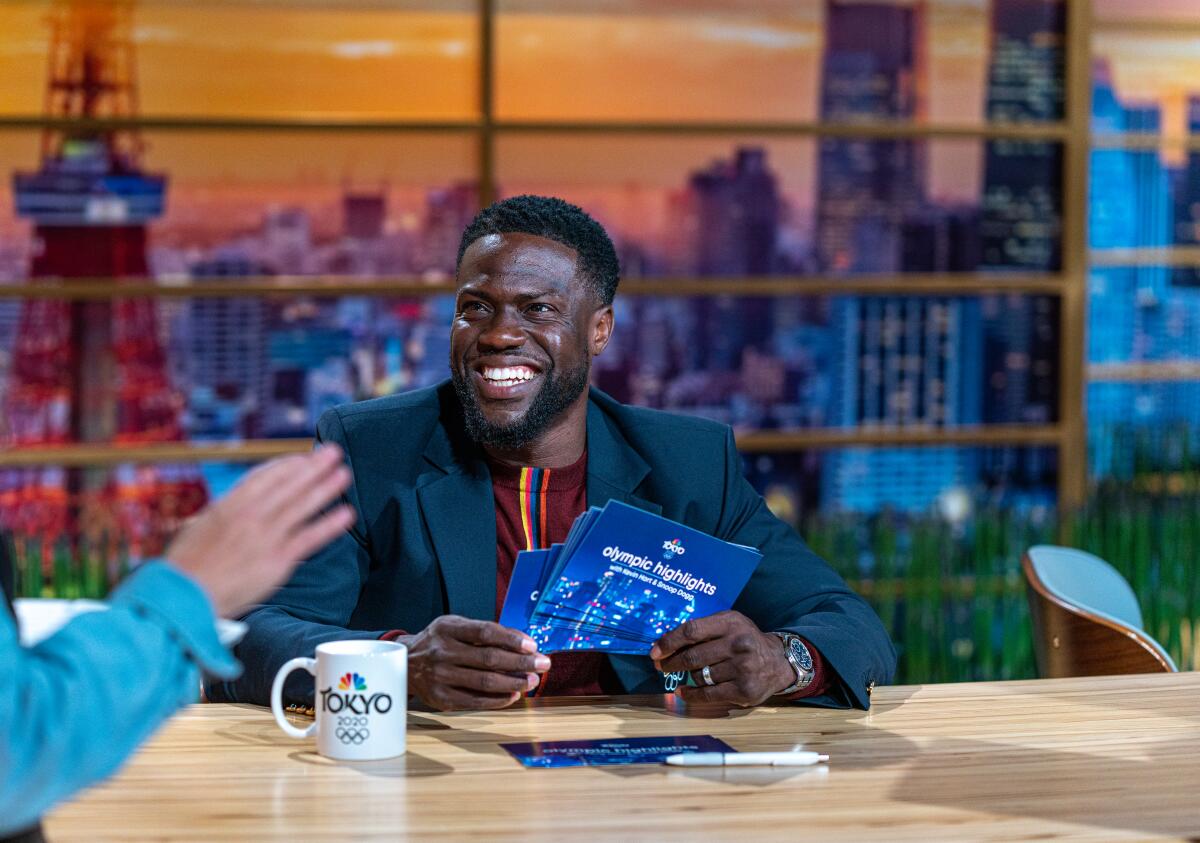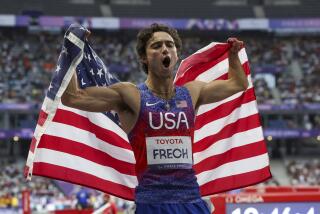Kevin Hart’s ‘Olympic Highlights’ went viral. Can his LOL brand be a global force?

Pairing Kevin Hart and Snoop Dogg for an Olympics highlights show wouldn’t have been an obvious move to many Hollywood executives.
But it was a no-brainer to Jeff Clanagan, chief executive of Hart’s digital media company Laugh Out Loud. The idea came after the West Coast rap star’s commentary for the November Mike Tyson-Roy Jones Jr. fight went viral.
“I couldn’t think of anyone else to really pair Kevin with,” Clanagan said. “When Snoop did that boxing match and that went viral, it was, ‘OK, we’ve got to figure out another sports program for Snoop.’”
Inside the business of entertainment
The Wide Shot brings you news, analysis and insights on everything from streaming wars to production — and what it all means for the future.
You may occasionally receive promotional content from the Los Angeles Times.
The formula worked. “Olympic Highlights with Kevin Hart & Snoop Dogg” became one of the most-watched Olympics programs on Comcast Corp.’s year-old streaming service Peacock. A popular clip showed Hart and Snoop Dogg watching an equestrian event, with Snoop remarking, “The horse crip-walking, cuh. You see that?”
“Snoop and I being broadcasters and doing the Olympics is a recipe for funny if you allow us to be ourselves,” Hart said in an interview between taping segments last week. “This is what’s been missing from broadcasting for years... You’re looking at something untraditional.”
“Olympic Highlights” marks the latest success for Laugh Out Loud as the four-year-old company — led by Hart, Clanagan and President Thai Randolph — tries to grow into a global comedy empire by attracting digital audiences.
The company executives declined to disclose finances but said the business doubled in revenue and staff (to more than 30 full-time) last year despite the COVID-19 pandemic and that sales are expected to increase 50% in 2021.
Earlier this year, Roku released Hart’s action-comedy “Die Hart” on its free service after the show’s original home — Jeffrey Katzenberg and Meg Whitman’s ill-fated Quibi — collapsed. The show set a viewership record for Roku’s budding original programming efforts and was renewed for a second season.
Viewers watched an average of nine episodes of former Quibi shows in two weeks on Roku’s free, ad-supported streaming service the Roku Channel, the company said. More people watched than during shows’ entire lives on Quibi.
The company last year signed a deal with Comcast that included a minority investment from the cable giant and a multiyear first-look streaming pact with Peacock, which operates under the company’s NBCUniversal division.
NBCUniversal’s direct-to-consumer chairman Matt Strauss, in a statement, called the Olympic highlights series “a great example of the success we will find by providing a platform that allows Kevin to just be himself, develop fresh programming that embraces his unique personality and style of humor, entertain existing fans and engage new ones around the world.”
Laugh Out Loud’s strategy has changed significantly since Hart launched it in 2017 through a partnership with Santa Monica studio Lionsgate.
Whereas it briefly tried to compete as a subscription-based streaming app, LOL is now a multipronged company that makes shows for other distributors while building its brand through a variety of businesses spanning live events, satellite radio and an ad-supported streaming network on free platforms such as Pluto TV.
At a swanky Beverly Hills gala in 2017, Hart launched his Laugh Out Loud Network in an attempt to create an online comedy destination for young, diverse audiences. It debuted an app with a $3-a-month subscription version along with a free, ad-supported tier.
But right as LOL was coming on the market, the once-hot space of niche streamers was facing headwinds. NBCUniversal announced it was shutting down its short-lived comedy service Seeso the same month Hart’s app launched. LOL’s subscription service never quite caught on, though the app was downloaded 1 million times in its first 100 days.
Meanwhile, Lionsgate, which bought cable network Starz for $4.4 billion in 2016, increasingly focused on growing its Starz-branded pay-TV and streaming businesses. On the horizon were the streaming wars, in which Disney+ and HBO Max would battle Netflix for dominance.
Hello Sunshine, “South Park” and MGM deals reveal how streaming is boosting the value of content brands, not just libraries.
As the industry shifted, so did LOL. In early 2019, as the streaming battle was heating up, the company spun out of Lionsgate with Hart taking majority ownership. LOL relocated from its Santa Monica offices to Encino, home of Hart’s Hartbeat Productions. Hart is proud of the pivot.
“I think we’re getting the respect of being one of the few companies that survived at a time when so many companies like this were being started and were falling apart,” Hart said. “There’s so many that are gone with the wind.”
Randolph said Hart having majority control allowed the company the flexibility to grow faster and adapt. The fast-paced clip at which the company operates reflects Hart’s intense on-screen energy. At a July retreat in Cabo, executives discussed how to “dream bigger” for the company, Randolph said.
“For us, the conversations we’ve had are, ‘How big can this be?’” she said. “It’s making this happen at an exponential level and speeding up the pace and doing it in a bigger fashion.”
LOL produces its programming at two studio facilities in Canoga Park totaling 42,000 square feet, including a full gym, kitchens, greenscreen soundstage, recording studio, a podcast room, lounge area and “Zen station” with massage chairs. When The Times visited the studios, workers were setting up the stage for Hart’s SiriusXM show, “Straight From the Hart,” where in 2019 he issued an apology for past homophobic Twitter jokes that led to his losing a gig hosting the Oscars.
The business is composed of four distinct units: LOL Studios, responsible for video productions including the Olympics series and the talk show “Hart to Heart,” which debuted on Peacock this month; an audio division with a SiriusXM deal, which expanded last year; LOL Network, the company’s free, ad-based streaming channel, available through streaming services like Pluto TV, Peacock, Tivo and Redbox; and LOL X, which produces live events. The LOL X division aims to create cultural events and festivals like those launched by brands such as Essence and Complex.
Live events are of particular interest to Clanagan, who was instrumental in Hart’s rise as a standup star. Hart’s breakout performance was in Shaquille O’Neal’s “All Star Comedy Jam” special from 2009, which Clanagan produced. Clanagan booked Hart, whom he’d only known from “Soul Plane,” as the opening act. But Hart’s set killed so Clanagan changed the order of the performers during post-production.
“Kevin had this great performance, so I basically re-edited it to have Kevin close the show,” Clanagan said.
The company is looking to expand, including overseas. For example, Comcast this year is expanding Peacock to the UK and other countries to more than 20 million customers of the Sky pay-TV service, which Comcast also owns. In July, the company launched a screenwriting fellowship with the Sundance Institute to support up-and-coming Black women in comedy. Additionally, LOL is expanding into animation.
There’s ample reason for content creators to feel emboldened.
Reese Witherspoon recently sold her company Hello Sunshine at a valuation of $900 million to a Blackstone-backed media venture formed by former Disney executives Kevin Mayer and Tom Staggs. Media companies are voraciously searching for content, with Amazon buying MGM for $8.45 billion (pending regulatory approval).
Asked whether the company would be sold shortly after this article’s publication, Clanagan laughed.
“I got a call this morning with one of our connected TV partners,” he said. “‘OK Jeff, we’re about to do this deal, is this going to go away in three weeks?’ He had the same question as you.’”
The recent sale of Hello Sunshine and the high demand for content means only good things for LOL, Hart said.
“When I hear about Reese’s success, that makes me go, ‘dope,’” Hart said. “That’s super dope for her, super dope for her company and super dope for us because that’s a door that’s now open and something you can work toward.”
More to Read
Inside the business of entertainment
The Wide Shot brings you news, analysis and insights on everything from streaming wars to production — and what it all means for the future.
You may occasionally receive promotional content from the Los Angeles Times.













